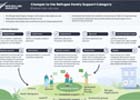Changes to the Refugee Family Support Category
11 July 2022
Effective from 1 July 2022
- The Refugee Family Support Category will increase to 600 places per year
- Registrations and applications will have no cost
- Immigration New Zealand will coordinate and pay for medical assessments
- Immigration New Zealand will coordinate travel and pay for flights for approved cases
- Accommodation assessment process will be easier and include support from a settlement service provider
The Updated Processes
Step 1: Registration
Sponsor Completes a registration form and confirm that they will be responsible for accommodation
Step 2: Application
Applicant to complete residence application
Step 3: Assessment
Application assessed by Immigration New Zealand
Step 4: Approval
Successful applications are approved
Step 5: Accommodation plan
Sponsor completes an accommodation plan. Help is available from a settlement service provider
Step 6: Flights
When the Sponsor notifies Immigration New Zealand that an accommodation plan is complete and housing is arranged, Immigration New Zealand will book travel
Step 7: Preparation
Sponsor prepares for arrival of family. They can seek advice and guidance from the settlement service provider in their area
Step 8: Family’s arrival
The settlement service provider visits the family in the first week and connects the family to the community orientation programme and ensures the family knows how to access essential services
Step 9: Orientation
Family participates in community orientation programme
Step 10: Ongoing support
The settlement service provider and sponsored family connect to see how things are going. The sponsored family can seek further advice and support as they move through their settlement journey in Aotearoa.
Image: sponsored family is supported in their resettlement process
The sponsored family is supported throughout their resettlement process. They get immediate support from their sponsor and a settlement service provider in their local area. They also get community support from a wide range of groups such as schools, health navigators, general practitioners (GPs), community groups and refugee organisations active in their local area.

